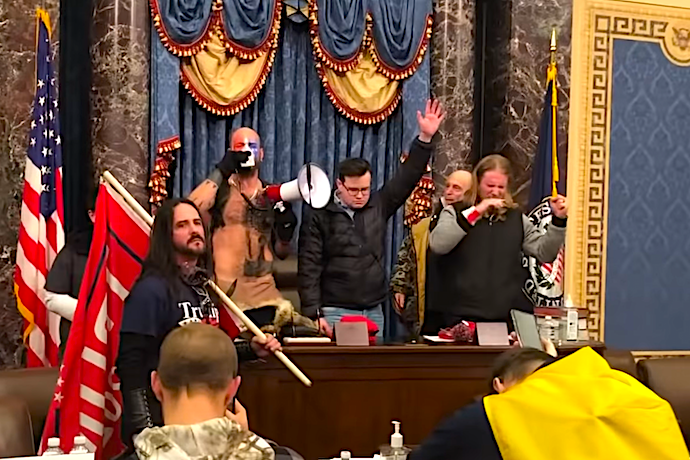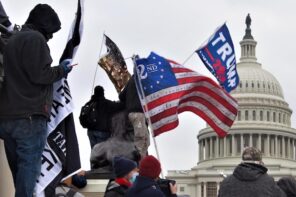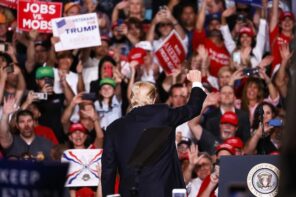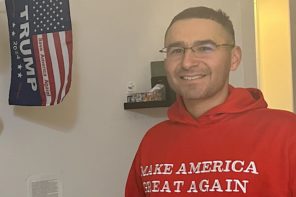Yesterday, for the first time, we heard about Christian Nationalism in a government conversation about the January 6 insurrection. The conversation some of us had been having about Christian Nationalism may have entered the mainstream in the wake of that attack, but politicians—even those promising to get to the bottom of the attacks—ignored the role this political theology played in the attack. They can ignore it no longer.
Christian Nationalism is an identity based around the claim that America was founded as a Christian nation, that we’re based on Judeo-Christian principles, and, most importantly, that we’ve strayed from that foundation. It’s a political identity based on lies and myths. It’s a permission structure that uses the language of return, of getting back to our godly roots, to justify all manner of hateful public policy—and even attacks on our democracy.
On January 6, I watched in horror as this wave of Christian Nationalism broke over our Capitol, threatening the peaceful transfer of presidential power for the first time in American history. I’ve been deeply immersed in the insurrection investigation ever since, seeking to understand and write about the role Christian Nationalism played on that horrible day. Some of that work will appear in a new epilogue for the paperback of my book, The Founding Myth: Why Christian Nationalism Is Un-American, which focuses on the January 6 terrorist attack. Every day I learn more about how the permission structures within Christian Nationalism motivated the terrorists and how it cuts across the other motivations and identities we saw that day, including the absurd Qanon conspiracy. They believed that they were fighting for God’s chosen one. And if God was on their side, who could be against them?
Trump’s second impeachment featured the first full airing of the January 6 attacks. But, despite the conversation entering the mainstream, nothing was said about the Christian Nationalist aspect of this assault. I feared—and still fear—that the January 6 Select Committee would do the same. When Rep. Cheney trotted out in her opening statement the Christian Nationalist war cry frequently heard in the lead up to January 6, “One Nation, Under God,” I was worried all over again that they were going to ignore, or cover for, Christian Nationalism.
But then the politicians listened to testimony of four police officers who were on the front lines that day. They spoke of the violence inflicted upon them. The injuries they suffered. The number of times they were electrocuted. The fingers trying to gouge out their eyes and seize their guns. How they were dragged into the mob and beaten. The chemicals they were doused with. The surgeries they’ve endured. The many colleagues that have resigned. One of their fellow officers took his own life.
They spoke about their anger with the cowardice and indifference of the politicians who deny the seriousness of the assault, many of whose lives were saved by these very officers. They spoke about the odious racial slurs and racism they faced that day. And finally, one of them, Officer Hodges, who was the officer trapped and nearly crushed to death between the doors as the mob surged through the Capitol, spoke about the Christian Nationalist aspect of this assault, though not in those terms:
DC MPD Officer Daniel Hodges describing the pervasiveness of Christian symbols among those who attacked him and other police officers during the January 6 insurrection.
"It was clear the terrorists perceived themselves to be Christians." pic.twitter.com/Eq71WSf9tR
— Jack Jenkins (@jackmjenkins) July 27, 2021
“It was clear the terrorists perceived themselves to be Christians. I saw the Christian flag directly to my front. Another read ‘Jesus is my savior, Trump is my president.’ Another, ‘Jesus is King'”
That Christian flag was carried into battle against America—carried alongside the Confederate flag. It was carried against the police officers protecting the beating heart of our democracy. The terrorists didn’t just parade the flag on the battle lines opposite Hodges, they carried that Christian flag onto the floor of the United States Senate. They attacked, they conquered, they paraded their flag on the vanquished ground . . . and then they said a prayer to Jesus in that senate.
Thank you for allowing the United States of America to be reborn. Thank you for allowing us to get rid of the communists, the globalists, and the traitors within our government. We love you and we thank you. In Christ’s holy name we pray. Amen.
The idea that “the United States of America [should] be reborn” and reborn “in Christ’s holy name,” which is how the prayer concluded, is central to Christian Nationalism. We cannot understand what happened on January 6 without understanding Christian Nationalism.
The officers who testified demanded justice. They demanded accountability. They turned to this committee, made up of U.S. Representatives whose lives they saved, who represent the democracy they saved, and they asked for justice and accountability. Our country needs it. But we will only get that reckoning if we grapple with the role that Christian Nationalism played in violently assaulting our democracy. Let’s hope this select committee doesn’t ignore, or worse, cover for, Christian Nationalism. Let’s hope this select committee listens to Officer Hodges. Because on January 6, Christian Nationalism proved that it is indeed un-American and that it will not go gently into the obsolescence for which it is bound. If we refuse to identify and confront this threat, it will strike again. The terrorists made that clear.





